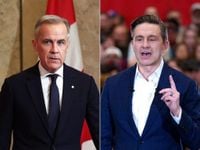As Canadians prepare to head to the polls on April 28, 2025, the political landscape is heating up, with a focus on which of the country’s top two federal leaders resembles U.S. President Donald Trump more closely. Mark Carney, who became prime minister on March 14, 2025, and Conservative Party Leader Pierre Poilievre are both facing scrutiny as they navigate their campaigns amid rising tensions with the United States.
During a recent debate on April 17, 2025, Poilievre argued that Carney is merely an extension of Justin Trudeau’s Liberal government, suggesting that he would continue to block crucial pipeline development. This assertion reflects a broader concern among Canadians about the future of energy policies and the economy as the election draws near.
Trump's influence looms large over the election, particularly after his controversial actions on January 6, 2021, when he attempted to overturn his election defeat. This disregard for the rule of law has raised alarms, prompting Canadians to consider the implications of similar attitudes within their own political framework.
Carney’s support for Trudeau’s decision to veto the Northern Gateway Pipeline has drawn particular ire from his opponents. During a House of Commons Industry Committee hearing on May 27, 2021, Carney, then vice-chair of Brookfield Asset Management and UN Special Envoy for Climate Action, expressed his approval of the veto. He stated, “I think it’s sensible... it was the right decision,” regarding the pipeline that would have transported 525,000 barrels per day of diluted bitumen from Alberta to Kitimat, British Columbia.
The Northern Gateway project had undergone a lengthy approval process, receiving regulatory and government backing on June 17, 2014, during Stephen Harper’s Conservative government. However, Trudeau’s veto on November 29, 2016, has been described as a significant blow to investor confidence, echoing the arbitrary measures often associated with Trump’s administration.
Sonya Savage, who spent nine years working on the Northern Gateway project before entering politics as Alberta’s energy minister, articulated the industry’s frustration. “When you get a veto after a very long, costly, arms-length, independent, quasi-judicial regulatory process... that undermines investor confidence which continues to this day,” she explained. This sentiment resonates across the energy sector, where many feel that such arbitrary decisions hinder economic growth.
In addition to the Northern Gateway situation, Carney’s support for Bill C-69, officially known as the Impact Assessment Act, has further fueled criticism. Passed in August 2019, the bill has been described as unconstitutional by the Supreme Court of Canada in a ruling on October 23, 2023. The court deemed it violated the division of powers outlined in the Constitution, leading to further legal challenges.
Amendments to Bill C-69 were filed on April 16, 2024, but Alberta’s government has sought clarification from its Court of Appeal regarding their constitutionality. One legal expert, who requested anonymity, voiced skepticism about the amendments, stating, “I have no doubt these amendments will be struck down, too. It gives politicians too much arbitrary discretion and continues to violate the division of powers in the constitution.”
With Canada’s real GDP per capita growth lagging behind other OECD countries—ranking last out of 37 economies from 2014 to 2024 at just one percent—the economic implications of these policies cannot be ignored. In stark contrast, Ireland topped the list with a remarkable 70 percent growth during the same period.
Critics argue that Carney’s inconsistent stance on energy policies mirrors Trump’s unpredictability. While he has claimed a desire for Canada’s oil and gas sector to be competitive, he simultaneously supports emissions caps on the industry. This duality raises questions about his commitment to the sector’s future.
Moreover, Carney’s investment decisions have also come under scrutiny. Although he opposed pipeline projects in Canada, he has supported investments in pipelines abroad, including in the United Arab Emirates and Brazil. This inconsistency has drawn parallels to Trump’s often contradictory statements and policies.
As the election approaches, polls indicate that Carney is likely to maintain enough support to secure a fourth term for the Liberals. This prediction puts pressure on Poilievre, who has seen his party’s significant lead in the polls diminish in recent months, particularly in light of Trump’s recent trade war declaration against Canada and his controversial remarks about potentially annexing the country as the “51st state.”
The political debate continues to intensify, with both leaders vying for the attention of voters who are increasingly concerned about the implications of their policies in an era marked by global uncertainty and economic challenges. With Trump’s shadow looming over the election, Canadians are left to ponder which leader truly embodies the traits they associate with the controversial U.S. president.
As the dust settles after the debates and the election approaches, one thing is clear: the choices made by Canadians on April 28 will shape the future of the country at a critical juncture. The question remains—will they choose a leader who reflects their values or one who mirrors the unpredictable nature of Trump?





